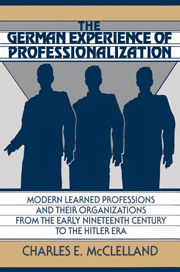 The German Experience of Professionalization
The German Experience of Professionalization Book contents
- Frontmatter
- Contents
- Acknowledgments
- Abbreviations
- Part I The problem of professions in Germany
- Part II The transition to modern professions in the early nineteenth century
- Part III Unified professions in a unified Germany?
- Part IV Breakthroughs and breakdowns: The professions enter the era of cartels and unions
- Part V The Weimar era
- 10 The “free” professions under Weimar
- 11 Professions based on law and pedagogy in the Weimar era
- Part VI The fate of professions under and after fascism
- A word about sources
- Index
10 - The “free” professions under Weimar
Published online by Cambridge University Press: 06 July 2010
- Frontmatter
- Contents
- Acknowledgments
- Abbreviations
- Part I The problem of professions in Germany
- Part II The transition to modern professions in the early nineteenth century
- Part III Unified professions in a unified Germany?
- Part IV Breakthroughs and breakdowns: The professions enter the era of cartels and unions
- Part V The Weimar era
- 10 The “free” professions under Weimar
- 11 Professions based on law and pedagogy in the Weimar era
- Part VI The fate of professions under and after fascism
- A word about sources
- Index
Summary
The models of modern professionalization developed in the Anglo-American world, as discussed in the introduction, present many serious shortcomings when applied outside that world of experience. One of the untested assumptions underlying them is a degree of political, economic and social stability that allows actors to carry out their roles consistently and over protracted time periods. If, to take one example, the American Medical Association was to exploit the argument of the superiority of school medicine in obtaining monopoly status for American licensed physicians, it needed stable and effective governments to squelch the quacks.
From 1918 to 1933, Germany lacked stable and effective governments comparable to those of America and Britain. The shifting multiparty coalitions of the Weimar Republic and the rapid change of cabinets implied a weak state constantly distracted by crises. Of course the old imperial administrative bureaucracy carried on, giving a certain continuity, but political imperatives from the parliament now had more weight, although they tended to cancel each other out over the long run.
In the face of this weak state, many historians have suggested, the influence of the Verbände, of corporate lobbies, unions, associations, and dozens of other types of groups reached new levels during the Weimar era. The professional associations were not least among those clamoring to achieve their own aims, in this case what one might term the completion of the professionalization agenda. Did they?
- Type
- Chapter
- Information
- The German Experience of ProfessionalizationModern Learned Professions and their Organizations from the Early Nineteenth Century to the Hitler Era, pp. 175 - 192Publisher: Cambridge University PressPrint publication year: 1991


